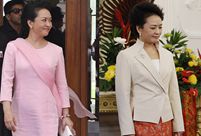 Close-up view of August Aerobatic Team
Close-up view of August Aerobatic Team
 Goddesses married in 2014
Goddesses married in 2014
 Polar region photos raise worldwide awareness of global warming
Polar region photos raise worldwide awareness of global warming
 Get off at the last stop — Beijing Subway in vision
Get off at the last stop — Beijing Subway in vision
 Top 100 beauties in the world!
Top 100 beauties in the world!
 Gallery: Who is the most beautiful one?
Gallery: Who is the most beautiful one?
 If you like autumn, put your hands in the air!
If you like autumn, put your hands in the air!
 Fan Bingbing's "Queen style" in new play
Fan Bingbing's "Queen style" in new play
 Lingerie show at 2014 Miss China
Lingerie show at 2014 Miss China
 J-10 fighters show aerobatic stunts in smog-free sky
J-10 fighters show aerobatic stunts in smog-free sky
BEIJING, Dec. 11 -- China will usher in a crucial year in 2015 for its comprehensively deepening reforms, which are set to bring an important opportunity for other countries' economic development, overseas experts said.
During the 2014 Central Economic Work Conference that concluded Thursday, Chinese leaders mapped out major economic policies and priorities for the coming year based on an economic "new normal."
China will not only focus on boosting quality and efficiency of economic growth next year, but also stick to the theme of seeking progress while maintaining stability.
According to estimates of the International Monetary Fund (IMF), China has topped the world with its contribution to the global economy accounting for 27.8 percent in 2014.
Moreover, China's economic growth driven by its structural reform is expected to contribute to 30 to 40 percent of the Group of 20's goal for an additional 2-percent growth over the next five years.
During the meeting, Chinese leaders agreed that China should deepen reforms highlighted by an innovation-driven concept.
Since the establishment of the Shanghai Free Trade Zone (FTZ), a testing ground launched in September 2013 for China's exploration of new ways in reforms and opening up, foreign investments have increased every month and nearly 1,800 foreign-invested enterprises set foot in the zone.
Next year, the Shanghai FTZ will continue to push forward institutional innovation, further broaden financial openness, strengthen financial regulation, and expand other fields of reform.
William Adams, a senior international economist with the PNC Financial Services Group, said China carried out remarkable reforms in the financial area this year.
On Nov. 17, China officially launched the landmark Shanghai-Hong Kong Stock Connect, aimed at linking up the stock exchanges of Hong Kong and Shanghai.
It was an important step for the country to make the capital account freely convertible, which will help the Chinese economy better incorporate into the global market.
If the scheme is further expanded in 2015, China will gradually set up a more market-oriented, incorporated capital market.
Meanwhile, the Chinese government approved five private banks this year, in a bid to break monopoly and shore up private capital.
On Nov. 22, the People's Bank of China, China's central bank, lifted the upper limit of the floating band of deposit rates to 1.2 times the benchmark from the existing 1.1 times, laying a foundation for further liberalization of interest rates.
Huang Yuchuan, senior research fellow with the Carnegie Endowment for International Peace, a U.S. think tank, said some new policies implemented by China next year will help the country cast off negative factors on household consumption.
"The most important is liberalizing hukou residency policies which would stimulate consumption and also encourage more investment in social infrastructure. This would increase demand and support a higher growth rate," he said.
While creating a miracle in economic growth, China, the world's second largest economy, also paid a huge price on environment.
This year, the Chinese government has eliminated excess capacity in the production of cement, and iron and steel.
Nearly a half of the 80 investment projects for private capital, announced by the National Development and Reform Commission, are clean energy-related projects.
China's industrial upgrade and optimization will unleash huge market demand, which will boost not only its own domestic demand-driven economic development, but also the recovery of the world economy, experts said.
Chinese President Xi Jinping noted at the APEC CEO summit in November that China is expected to import 10 trillion U.S. dollars worth of commodities worldwide while China's outbound investment will amount to 1.25 trillion dollars in the next decade.
The significant volume of Chinese market and its outbound investment means China has become a powerful propeller to the world economy.
Whereas China has been persistently dedicated to building a cohesive regional trade network and a complete regional connectivity, China continuously pursues further regional development of the "21st Century Maritime Silk Road" and the "Silk Road Economic Belt."
China has also set its mind on facilitating an open world economy, mainly via platforms such as the aforementioned regional economic cooperation platforms, the Asian Infrastructure Investment Bank, the BRICS Development Bank, the Silk Road Fund and the Euro-Asia High-Speed Transport Corridor.
As China is transforming from a "world factory" to a major global market and investor, its continuous growth of outbound investment has been beneficial to destination countries of Chinese capital in respect of industrial sector upgrade and independent development capacity.
Moreover, money and technologies are not the only things Chinese investors can offer. They can also help boost tax revenue and employment.
From 2005 to 2013, China has invested about 11.7 billion dollars in British infrastructure constructions. And investments like this are estimated to soar up to 105 billion dollars in 2025.
China and India have inked a five-year plan on economy and trade cooperation, in which China will make an effort to invest 20 billion dollars in the industrial sector and infrastructure development of India.
Chinese equipment and technologies on railway transport are to be applied in Brazil, as Rio de Janeiro -- the host city of 2016 Summer Olympic Games -- will see a lot of Chinese-made railways and trains in its light rail system.
In addition, China has signed 12 free trade agreements, which lower trade barriers of 20 countries and districts for Chinese business. China has also wrapped up free trade agreements with South Korea and Australia.
Zhuo Shaojie, deputy director of Chinese Study Center at the University of Melbourne, said: "China is working hard to facilitate the economic stabilization in Asia and the Pacific, as wells as in the world, and has actively participated in the global governance and the building of an open world economy."
The global economy can benefit significantly from the efforts made by China, Zhuo added.
(For the latest China news, Please follow People's Daily on Twitter and Facebook)
 20 years on: Relocated Three Gorges residents through lens
20 years on: Relocated Three Gorges residents through lens PLA HK Garrison veterans leave behind beautiful smiles
PLA HK Garrison veterans leave behind beautiful smiles Representative beauties of each province in China
Representative beauties of each province in China Chestnut girl goes viral online
Chestnut girl goes viral online Victoria's Secret Fashion Show
Victoria's Secret Fashion Show In photos: Bright and brave female soldier of PLA
In photos: Bright and brave female soldier of PLA China's charming first lady
China's charming first lady Excellent photos of Zhuhai Air Show
Excellent photos of Zhuhai Air Show China's heavyweight aircraft
China's heavyweight aircraft An old problem
An old problem Despite torture report, US escapes censure
Despite torture report, US escapes censure  Inflation hits five-year low
Inflation hits five-year low Runaway brides
Runaway bridesDay|Week|Month